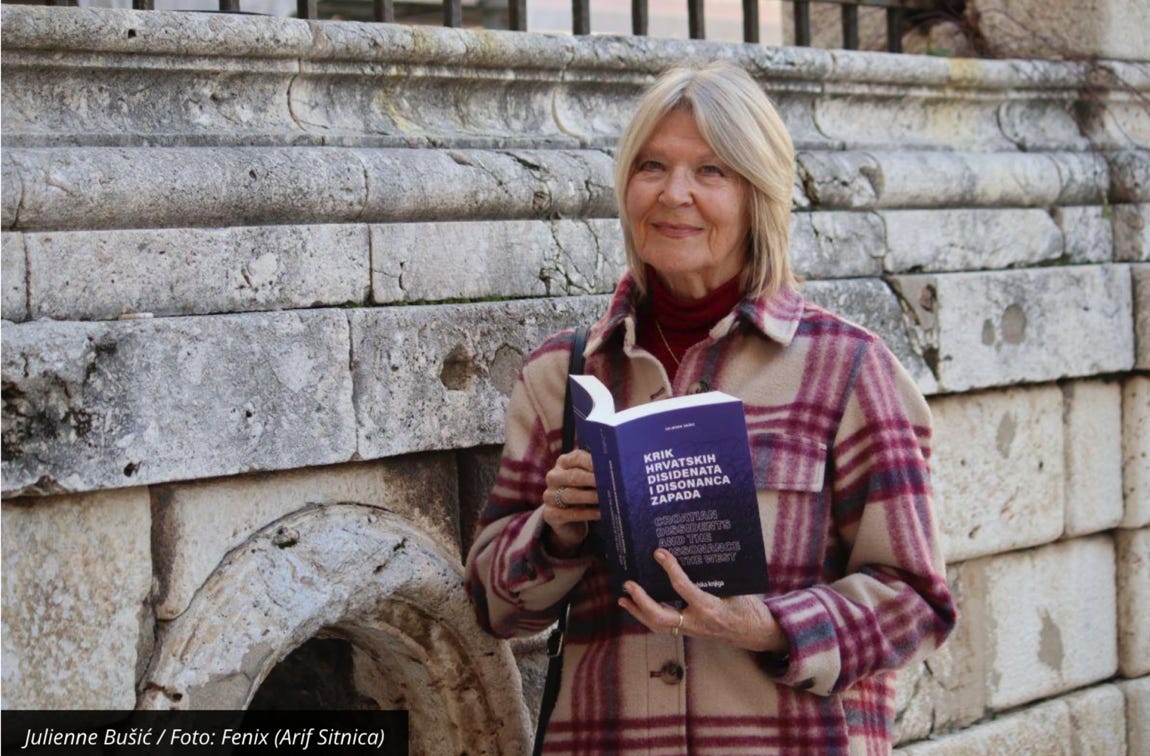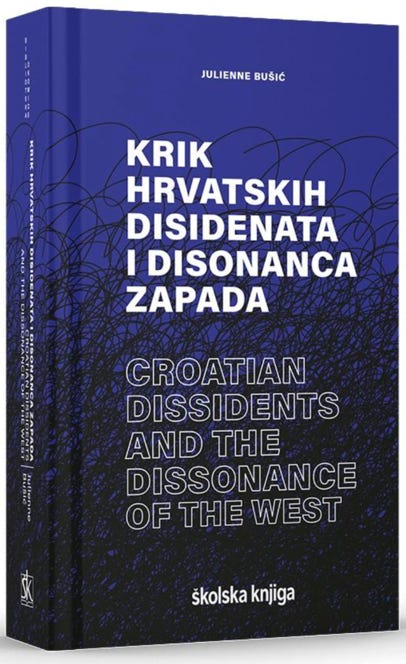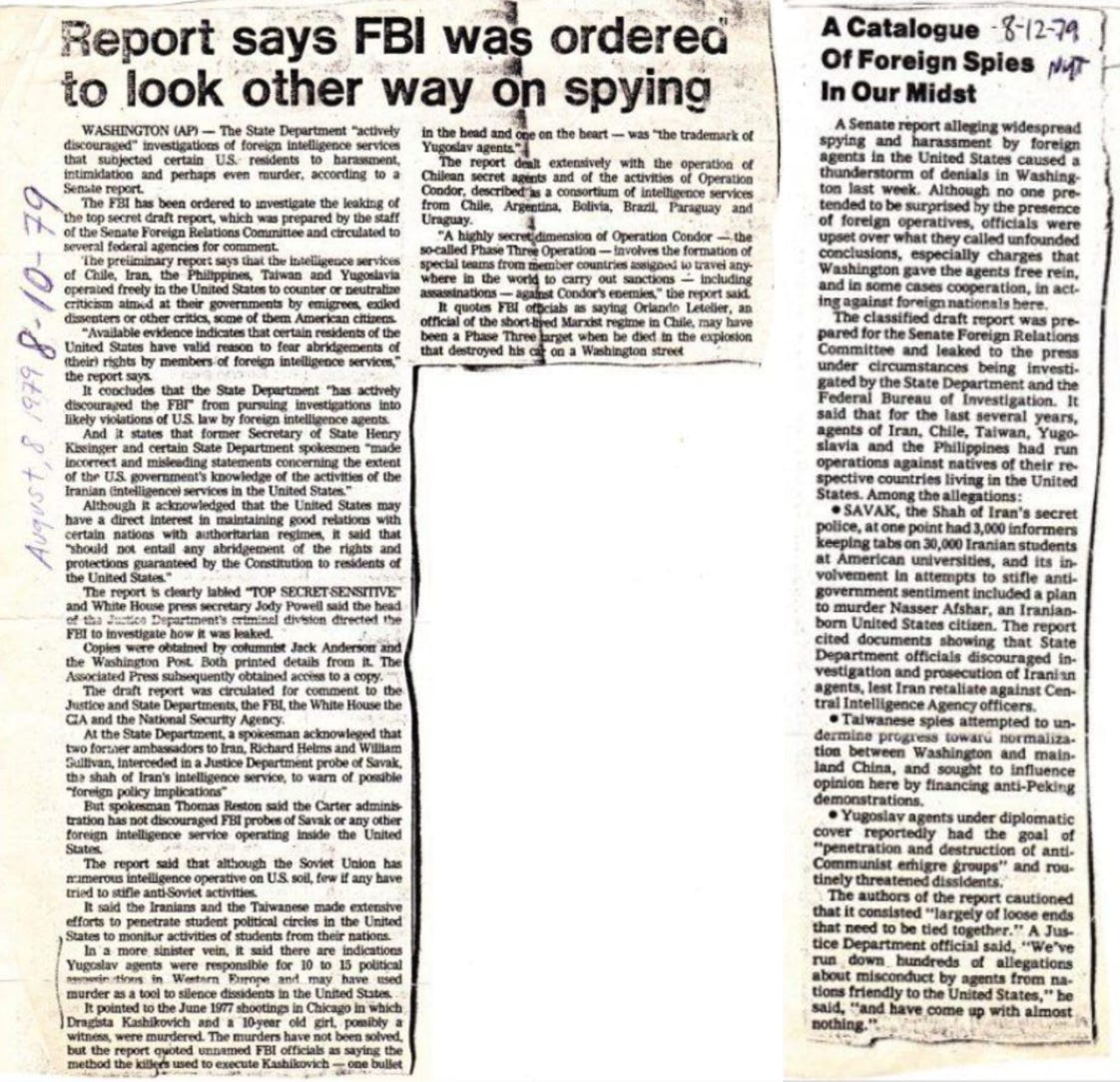Translated by: Dr. Dorothy McClellan
JULIENNE BUŠIĆ:
Cold-Blooded Murders of Croatian Dissidents
A book entitled The Cry of Croatian Dissidents and the Dissonance of the West by Julienne Bušić, wife of the late Zvonko Bušić, has recently been published. It analyzes the strategy that the West, especially the United States, implemented to support the preservation of Yugoslav unity, while suppressing, marginalizing and persecuting Croatian dissidents.
The main focus is on the report by George Kennan, the American ambassador to the former Yugoslavia, who described in detail the tactics used to suppress criticism of Tito’s regime.
The author of the books, Julienne Bušić, is an American-Croatian writer, translator and political activist, known for her involvement in the fight for Croatian independence during the 1970s. Born in 1948 in the United States, where she studied literature and anthropology, Bušić became famous because of the political actions taken by Croatian emigrants, including her husband the late Zvonko Bušić, to draw international attention to the situation in what was then Yugoslavia.
FM: First of all, I would like to know why you decided to publish this new book, The Cry of Croatian Dissidents and the Dissonance of the West. It is a topic that has not been explored in detail before: How the West betrayed its own ideals in relation to critics of the Tito regime.
But that was simply not true. Most European countries collaborated with Germany in some way, but they were not treated as harshly and unfairly as Croatia.
FM: Why?
JB: Of course, it was known that Tito had “broken up” with Stalin (which was not entirely true, as he consulted with him on almost every move and supported him in all U.N. resolutions). Therefore, it was assumed that Tito would be treated more leniently. However, until the archives of the U.S. State Department and other institutions became publicly available, it was impossible to know the extent of the West’s collaboration with Tito’s criminal regime. I was shocked by many of the documents because they clearly illustrated the cold-bloodedness with which a geopolitical agenda was being pursued at the expense of all the democratic principles that the West, and especially the US, supposedly stood for. As an American born in the US, I was outraged, especially since my husband Zvonko was personally affected, as were many of his closest friends, including Bruno Bušić and others.
At that point, I decided to research as many documents as possible to illustrate the thesis of the book and to include materials that had never been published before, such as Dražen Budiša’s closing statement at the sentencing, his prison photos, and two interviews with Presidents Franjo Tuđman and Vlado Gotovac that were never published because the tapes were confiscated from the journalist who recorded them at the airport upon leaving the country. The book also includes an important contribution from two excellent historians, Luka Knez and Zlatko Begonja from the University of Zadar, who wrote a chapter on how the international press was manipulated, monitored, intimidated and prevented from reporting the truth about the crimes of the Tito regime.
It is important to refute false narratives in general, but in the case of Croatia these narratives continue to influence everything that happens, so it is especially important to confront them.
FM: What are the key themes that the editors address in the introductory texts of the anthology The Cry of Croatian Dissidents and the Dissonance of the West?
JB: The main theme around which all the others center is the widespread and carefully designed strategy of the West (especially the U.S.) to suppress, marginalize, belittle and even persecute Croatian dissidents in the name of preserving Yugoslav unity.
This strategy is described in detail in the report of George Kennan, who was the U.S. ambassador to Yugoslavia at the time. The strategy involved all levels of society in a kind of group effort to stifle any criticism of Tito's criminal regime and discredit or ignore his critics. Particularly shocking are the parts that reveal the lengths to which the authorities were willing to go to protect the false narrative of Yugoslavia as a "socialist" rather than a repressive communist state in which the Party controls every aspect of life.
Here is just one example from Kennan's report on creating a positive perception of Yugoslavia:
"Public access must, in my opinion, include statements from the president that are not superficial. Several public statements or speeches by other high officials should be included. Efforts should be directed at finding qualified younger people to tour the country, foreign study groups, universities, etc., with the aim of explaining the objective facts and basis of our policy. In addition, high-level access to key people in the press will be required, not just two or three, but everyone who is important in that context. Special attention should be paid to publishers of weekly magazines. Government experts will know best how to use radio and television. I would emphasize, however, that this is not a one-time statement but a persistent, long-term effort in which the repetition factor is used to the maximum."
This passage in itself illustrates the pervasive and relentless support for the Tito regime and the way it has penetrated every conceivable social structure, often in a manner that could be considered antidemocratic.
FM: How does the collection contribute to understanding the Croatian national question and the dysfunctionality of Yugoslav federalism?
JB: By examining the positions of Western democracies, which, in their desire to justify their own interests, portrayed the Yugoslav system in a far more favorable light, it sheds light not only on the true state of affairs in Yugoslavia, but also on the difficult position of Croatian dissidents. How, without understanding the position of the West, can one understand the true position of Croatian intellectuals, and of the Croatian national question as a whole?

Unlike other national groups from Eastern Europe, Croatian intellectuals never had the support of Western states, although their ideas, especially regarding the self-determination of peoples and human freedoms, were based on the fundamental democratic principles of the West.
The book therefore reveals the full gravity of the Croatian national question, which was captured on the one hand by the totalitarian Yugoslav regime, and on the other hand unjustly rejected by Western states. Western states not only did not provide assistance to Croatian intellectuals, but they also used them in international trade, all with the aim of achieving political interests. Although it gave up its ideals, the West paid the lowest possible price by suppressing the Croatian national question, and achieved its own interests.
FM: How were Serbian political and administrative structures connected to the repressive apparatuses in Croatia?
JB: We must remember that Serbs were overrepresented in every segment of society: diplomacy, education, media, army, government, and therefore it is not surprising that they also controlled the intelligence services. However, we should not run away from the fact that Croatians spied on Croatians, that Croatians carried out liquidations of Croatian emigrants, and that Croatians imprisoned and persecuted Croatians. The rule that each nation deals with its own problems was introduced in order to maintain the status quo within the framework of inter-ethnic relations in Yugoslavia. Although this is not only difficult to understand today, but also somewhat horrifying, the fact is that reality is far more complex than it seems at first glance. After all, why is there no talk today about the liquidations of Croatian emigrants abroad? Or, why are there still taboo topics today about the suffering of the Croatian people in the second Yugoslavia? The answers, I am quite sure, entail numerous unpleasant facts, which are far more controversial than a simplified observation of the relations between Croatians and Serbs.
FM: What are the main reasons why dissidents from Yugoslavia remained unaccepted by Western politics and media in the context of their struggle for freedom?
JB: As I have already explained, the main reason was the Western belief that Yugoslavia must be preserved at all costs, because its disintegration would be disastrous for Western geopolitical goals, which for much of that period included preventing the spread of Soviet influence. As a result, Croatian dissidents were seen as threats to the same extent as sympathizers of communism in, for example, the United States. Both groups posed a threat to U.S. political goals: one for supporting Soviet ideology, the other (at least a large number of them) for supporting Croatian independence, which meant the disintegration of Yugoslavia. Ironic, isn’t it?
In addition, Yugoslav intelligence services were active against Croatian dissidents in the diaspora, often in collaboration with U.S. intelligence services. This collaboration was openly described in the mainstream media in 1979, after a U.S. Senate report on the subject was leaked. The New York Times wrote that the State Department “actively discouraged” investigations by foreign intelligence services that harassed, intimidated, and even possibly killed certain American citizens. The report, in a darker tone, states that there are “indications that Yugoslav agents are responsible for 10 to 15 political assassinations in Western Europe and that they may have used the killings as a tool to silence dissidents in the United States.”
So, not only were Croatian dissidents ignored and suppressed, they were also silenced in the most extreme ways, as in the case of Bruno Bušić. And while the entire Western media covered the murder of Bulgarian dissident Georgi Markov in London, the murder of Bruno Bušić was a taboo subject. Books, films, and articles continue to be written about Markov, while Bruno Bušić is mentioned only in the Croatian media.
FM: How are the sources from the collection of the Cry of Croatian Dissidents related to later events in Croatia, including the wars of the 1990s and the transition period?
JB: Many were unpleasantly surprised by the strong support of U.S. Secretary of State James Baker (with the support of Budimir Lončar) for Yugoslavia at the very beginning of the Homeland War. However, until the last moment, the U.S. government sincerely believed that it would be able to preserve Yugoslavia with all available means and influence. Only when it became clear that the will of the Croatian people would prevail did the U.S. change course. Ultimately, they are Realpolitikers, not humanitarians.
In addition, due to the fact that there was no lustration in Croatia, for various reasons, including the untimely death of President Tuđman, many of the same structures remained intact. The actors simply changed sides without changing their fundamental ideologies. That is why today we are faced with the problem of not opening archival materials and key historical questions, the answers to which could, at the very least, really help liberate the Croatian people from the shackles of the former totalitarian system. It should also be noted that we Croatians, as a young people, are still in the process of national construction, which is still not complete. In this sense, I believe that historical interpretations, based on the truth and archival materials and freed from the totalitarian legacy, would significantly accelerate the process of national construction, which should be based on a democratic basis and a centuries-old historical tradition, which some Western countries could only dream of.
FM: The book was published as a bilingual edition, which is unusual, at least in Croatia. Why?
JB: It is important that the outside world gets the opportunity to inform itself about Croatian issues, because there is so much disinformation and misinformation. Unfortunately, we are lagging behind in this area, mainly because we did not have the networks that Yugoslavia built in diplomatic, political and media circles, and which were inherited by Serbia and Montenegro after the war. We're trying to catch up, and one of the best ways to do that is to publish, publish, and publish more, but in English. I have been involved in this effort for several years, and so far we have published many books in English, all of which can be ordered on Amazon; for example: The Croatian War of Independence, Ante Nazor; In the Eye of the Storm, Ante Gugo; The Resurrected Faces of Vukovar, and others. We also have ongoing joint cooperation with the American multilingual literary magazine The Gobshite Quarterly, which has published and continues to publish Croatian writers and poets, including Tomica Bajišić, Tomislav Marijan Bilosnić, Boris Biletić and many others. Ooligan Press, a publisher from my hometown, published a whole series of books called New Croatia, two of which I translated.
That is why the new book, Croatian Dissidents and the Dissonance of the West, is bilingual, because I believe it is of utmost importance that we translate and publish in English as much as possible about issues of key importance to Croatia. I would also like to mention that Luka Knez, who is the co-editor of the book, has an upcoming article in English, together with Zlatko Begonja, in Harvard University's Journal of Cold War Studies, which is a great achievement.
But even during the 1970s and 1980s, we were pushing for these translations. Bruno Bušić and I founded the Croatian Translation Society before his death. We gathered a group of translators, mostly from the United States, who were fluent in English and Croatian, and started translating all kinds of texts, for example, dissident interviews, articles, and so on. Bruno and the others would send me the materials, and once they were translated, we would send them to the media, human rights organizations, and politicians. Unfortunately, the importance of translation is not emphasized enough by the Ministry of Culture and other ministries. Most of the work is done and financed by individuals, as was recently pointed out by Nikola Knez, a director from the United States who has made several fantastic documentaries on Croatian (not Balkan, regional, or Yugoslav) topics. When asked how much support he received from the Croatian government for all projects, especially for the documentary about Operation Storm, he stated: "State institutions 0.1% for a film about Croatia's largest military operation. Then you can imagine how things are with other films! Can we say, positive zero?"
JB: In the 1970s, when numerous dissident activities were taking place, from petitions related to the Declaration on the Name and Position of the Croatian Literary Language to the events of the Croatian Spring, it was clear to any objective observer that these actions were ignored by the international media and political circles in the West. At the same time, other movements and protests, such as Charter 77 in Czechoslovakia and Solidarity in Poland, enjoyed widespread media attention and financial and moral support. At the time, I thought that there was a kind of “curse” on Croatia, because Serbian propaganda portrayed it, and very successfully, as a “genocidal nation” after World War II.


All Content © 2015-2025 Croatian Film Institute, All Rights Reserved